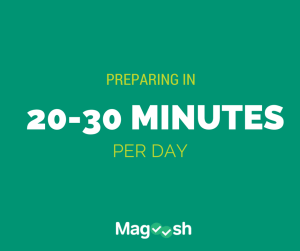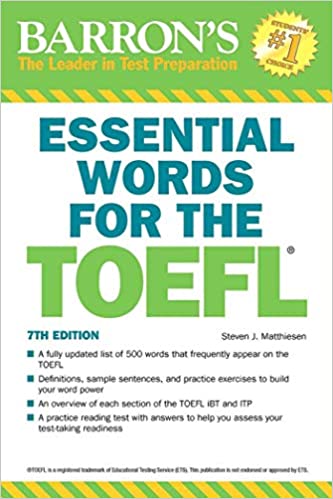One of the most challenging aspects of studying for a standardized test is simply finding the time to do so, especially if you’re already a full time student or have a full time job. That’s why it’s so important to make the most of the time you do have. And what is the best way to do that? With a study schedule, of course! While it may seem time-consuming at first to sit down and plan out a schedule instead of just diving right in to your studies, it’s worth your time — trust me! We’re here to give you expert TOEFL study schedule help.

Planning out a schedule will help you make sure you cover everything you need to in the amount of time that you have. A good study schedule will keep you on track, hold you accountable, and prevent you from cramming. It will help you study a little bit each day, making your TOEFL studies manageable (instead of completely overwhelming!). This post will tell you how to use a schedule in the most effective way.
If you don’t want to create your own study schedule from scratch, you can check out the Magoosh TOEFL schedules. These schedules will have you using all of the best TOEFL resources – including Magoosh TOEFL and The Official Guide to the TOEFL iBT, 4th Edition.
Click below to take a look at the study schedules we’ve created for our students:
These schedules should give you an idea of the structure of a good study plan.
How to Use a TOEFL Study Guide
We understand that our study schedules won’t work perfectly for everyone – we know that you all have different time constraints and needs! But it’s not too difficult to adapt a schedule to work for you. Here’s how to do it:
1. Decide if you’re even ready to start studying for the TOEFL. The TOEFL is, above all, a test of your English skills. If your English skills are not up to par, you’ll first need to work on those skills. Here’s how to decide if you’re ready to tackle the TOEFL.
2. Realistically determine how much time you actually have to devote to your studies. It’s easy to be over-ambitious with your time and bite off more than you can chew. We’ve all been there! When you’re first starting to plan out your study schedule, take an honest look at your current commitments – school, work, family obligations, exercise, etc. How many hours, realistically, do you have to devote to your prep each day? This should also give you some insight into how many months you’ll need to study. Our 1 month schedule, for example, requires about 2 hours per day, 6 days a week. If you have less time than that each day, plan to study for more than 1 month.
3. Be honest about your strengths and weaknesses. Are you great at writing but terrible at speaking? Good at speaking but your grammar could use some improvement? Whatever your strengths and weaknesses are, it’s incredibly important to be honest with yourself when it comes to assessing your skills. If you know you’re not great at listening, then you know you need to plan some extra time in your schedule to work on your listening skills. Likewise, if you’re really great at a particular section, you can adjust your schedule to spend less time on that section and more on a section that you struggle with.
4. Review your work and understand when you make mistakes. It’s one thing to make your way through an entire TOEFL book, but it’s another thing to actually learn what that book is teaching. At every step of your studies, be sure to go back and review your mistakes. Try to understand why you’re making these mistakes. This is truly the only way to improve!
5. Hold yourself accountable. It can be really hard to stay on track when you self-study, so it’s important to find a way to hold yourself accountable. Maybe this means you’ll find a study partner to have weekly check-ins with, or you’ll find an online TOEFL study group to help keep you motivated, or you’ll allow yourself a small reward when you meet a goal. Whatever you decide, it’s a good idea to have some system in place.
6. Don’t forget the end goal! One way to keep motivated is to remind yourself why you’re studying in the first place. Is it because you want to study in the US? Work abroad? Thinking about your larger goal helps you remember why it’s important to stick with your study schedule and try your best to do well on the TOEFL.
Takeaways
A strong study plan is a top-notch way to keep your studies on track. It helps keep you accountable to your goals and makes it easier to carve out time for studying. A good study plan will also make it easier for you to break the often overwhelming task of studying the TOEFL down into easy to manage chunks. Still wondering what study plan you should choose? Take our free practice test today to see what your baseline score is. This will help you better understand how much work and time you need to put into test prep. Then consider signing up for a Magoosh Premium Plan free trial to jump start your study plan with test-quality practice and expert explanations.







